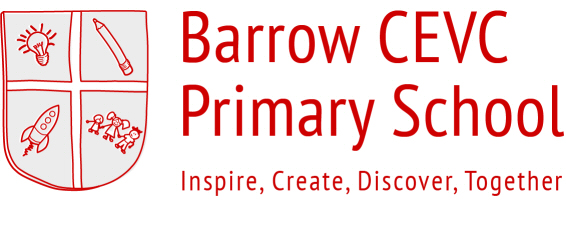

What is the ‘Curriculum’?
The term curriculum refers to WHAT is being taught in school. Simply put, this includes our subject content and lessons, along with any other enrichment activities we provide. Our curriculum is purposefully designed to ensure the children at Barrow receive integrated, coherent learning experiences that contribute towards their personal and academic learning and development, both now and in the future. The purpose of our recent important curriculum development work has been to ensure that our content choices, coverage, sequencing and progression supports these core aims.
How is Our Curriculum Organised?
At Barrow Primary School we are committed to teaching a broad, balanced and aspirational curriculum. To ensure that we are as effective as possible in meeting these aims, we are constantly reviewing our curriculum development priorities. This process ensures that our curriculum decisions are responsive and strategic. Indeed, it is more important than ever that our teaching reflects the needs of our children and takes into account the impact of the global pandemic on their learning and wellbeing.
The main aims of our most recent curriculum review were to:
We work with Unity Schools Partnership and our curriculum known as CUSP (Curriculum with Unity Schools Partnership) is underpinned by the very latest research evidence from education and the field of cognitive science.
Each class timetable has been very carefully structured to maximise learning time. We provide a knowledge-rich curriculum for our children within our expanded timetable. Our subjects are taught discretely which enables children to:
Within the long-term sequence for each year group, there are deliberately planned links between subjects that complement each other.
Our curriculum is vocabulary focused and aims to equip the children with the necessary academic and technical language required to talk about their learning in a precise manner, across the curriculum. Knowledge organisers are used within learning modules to support vocabulary development.
The acquisition of knowledge is underpinned by the implementation of a variety of teaching methods intended to help children retain and recall their learning. The children will access mini-quizzes at regular intervals within learning modules, challenging them to recall their learning; research shows that both the ‘spaced practice,’ and ‘retrieval practice,’ embedded within the curriculum will enhance pupils’ learning.
Our curriculum provides children with memorable experiences, visits and visitors from which they can learn. It is designed to encourage them to view the world outside of Barrow with excitement and curiosity. We very much hope that this will support us in developing independent and confident learners who know about their community, the wider world and how to make a positive contribution.
How does this enhance our Church School Christian Ethos?
In designing our curriculum, we have been inspired by Jesus’ words in John 10 about ‘living life to the full’ in the day to day school learning environment, and in a successful life beyond. The 'Barrow Big Ideas' will provide a framework around which all our Collective Worship sessions will be planned. The children will become familiar with Bible characters who have faced challenges and show positive traits of character, and learn Bible verses which are encouraging and motivating. Visitors such as our Open the Book team will work with us to promote the 'Barrow Big Ideas'. The decisions the children make about which charities to support and community outreach projects to run also link to them.
Further Information
We have created curriculum overviews for each year group which ensure coherence and progression in both knowledge and skill development in every subject. These are available for each year group on our Year Group Overviews page. A wealth of further information is also available on this website. If you have any questions, however, or would like more clarification on how our curriculum is designed or the implementation of our new approaches, please do not hesitate to contact Mrs Lucy Smith, Deputy Headteacher.